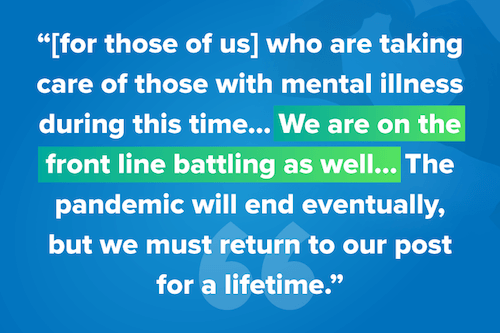May 05, 2020
By Audrey Z

My 19-year-old son isn’t social distancing. He isn’t washing his hands as much as he should. He leaves all day and comes home in the middle of the night. I have other young adult children living in my home following all the rules.
“You are his parents, why don’t you just make him stay in? Why don’t you just kick him out?”
For parents reading this who have a child with mental illness and/or chemical dependency, I’m sure you understand my anguish. Especially those of you who have a child with Oppositional Defiance Disorder (ODD) — you understand that there are no simple answers, no simple solutions. In addition to the ODD, my son has been diagnosed with generalized mood disorder, depression, anxiety, ADHD, RAD (Reactive Attachment Disorder), auditory processing disorder and learning disabilities. This all stems from the emotional deprivation and trauma he sufferedbefore we adopted him from Russia at 14 months.
Our requests mean nothing to him. Our logic and reasoning mean less. My child does not fear the virus. COVID-19 is a weak opponent. My sister, whose son is in the midst of drug addiction, said of her son, “This pandemic is nothing compared to his last relapse.”
As if life can’t throw enough punches, a week before the pandemic hit, my son and his girlfriend, with whom he has a four-month-old baby, broke up. No big surprise. But all of our emotional strength is being depleted trying to endure the pandemic. Now imagine having to start the “You need to be a responsible father” conversation at the same time as “please use oxygen masks.”
Every day, I think about telling my son to not come home, to find another place to live. Do I let him hit “rock bottom” during the worst pandemic in the modern history? Or do I say, “He is sick and now, more than ever before, he needs to know he has a safe place to go.” When I hear that door opening in the middle of the night, and I know he is home safe, I retrace his steps with my disinfectant bottle… then my body rests.
And what about my other children? They are upset and anxious enough. Missing college life, work, friends and even graduation. Do I want to spark a traumatic, loud and emotional family upheaval by asking him to leave? Do I keep paying for his cell phone, in case he gets sick? I wonder what happens if he gets sick. Will he wear a mask? Will he stay isolated? Will his nicotine- and marijuana-filled lungs be able to fight the virus?
Yes, he is still working — at a fast food restaurant. So there he is exposed, too. He would never not go. His job saves him. First off, he needs it. He is making car payments to us. His car is his refuge. He spends hours a day just sitting in it, trying to escape reality. As long as he is making his payments on time, we let him keep it. Secondly, work is his social circle. His friends there accept him. I am guessing some are like him, though I have never met one. “Birds of a feather…” you know the rest.
I don’t have answers. But I needed to speak out — directly to those of you with a child who needs to keep going to an AA meeting. To those who need the school social worker to help you all get through another day. To those of you who cannot stop their child from leaving to get a fix and returning to your home with the remnants of everyone they encountered. To those of you who are facing the same fears… you are not alone. I am here, and I am terrified.
To the doctors, nurses and first responders fighting the virus, I want to express my heartfelt “thank you.” To those who are taking care of those with mental illness during this time, another heartfelt, “thank you.” Maybe you, too, are one of the parents to whom I am speaking, and you have double duty. We are on the front line battling as well. We live in the world of constant unknowns. The pandemic will end eventually, but we must return to our post for a lifetime.
When he left this morning, my son turned back to me and said, “I took my medicine” before walking out the door. So there is always hope.
We’re always accepting submissions to the NAMI Blog! We feature the latest research, stories of recovery, ways to end stigma and strategies for living well with mental illness. Most importantly: We feature your voices.
LEARN MORENAMI HelpLine is available M-F, 10 a.m. – 10 p.m. ET. Call 800-950-6264,
text “helpline” to 62640, or chat online. In a crisis, call or text 988 (24/7).